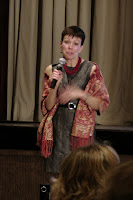The standards in USA and Canada in legal settings are very diverse. We are unclear who does the work and what we exactly do, so therefore we wanted to look further into this.
We surveyed interpreters from AVLIC and RID. Deaf and non deaf interpreters responded to the survey. The survey tool could be used to have it coded into SPSS. We also used focus groups. But at the presentation today we will present some of the findings.
A total of 1994 (?) interpreters responded. There is best practices document that refers to using deaf interpreters used in legal settings. We wanted to ask what the use of deaf interpreters in these settings would look like. We also wanted to look at best practices in preparation, consecutive interpreting and videotaping our work.
We asked a serie of questions about the use of DI (deaf interpreters). The decisions were based on:
- language issues
- availibility of DI (large urban areas had plenty of DI available, but in rural areas not)
- complexity of the case
- needs of the Deaf consumer (for example range of languages, for example Spanish)
- Court factors (for example complex cases, such as more deaf witnesses, etc)
We asked how interpreters prepared and later we asked how they prepared. Nearly 50% said that they would rely on the referring agency on providing them preparation materials. We also asked what happens if you are not prepared. They said:
- lack of confidence (if you as an interpreter are not confident, you do not sound confident, even though the deaf witness might be confident)
- anxious or nervous
- ....
When interpreters are working interpreting in legal settings, it can / should be videotaped. Of the respondents only 11.6% said that they will initiate the videotaping and the rest would not bother to ask.
Consecutive interpreting: if persons do not speak English, they should use consecutive. This is not always done.
We asked the interpreters what pieces of training do you need:
- Team processes, specifically D/H teams
- Orientation to the legal system
- Legal discourse
- Types of law
- Protocol - videotaping, qualifying, etc
- Should be very high in fluency the languages.
- More training in waht the consequences are of what they produce, what is the quality
- Collaboration between deaf and hearing organisation.

No comments:
Post a Comment
Note: only a member of this blog may post a comment.